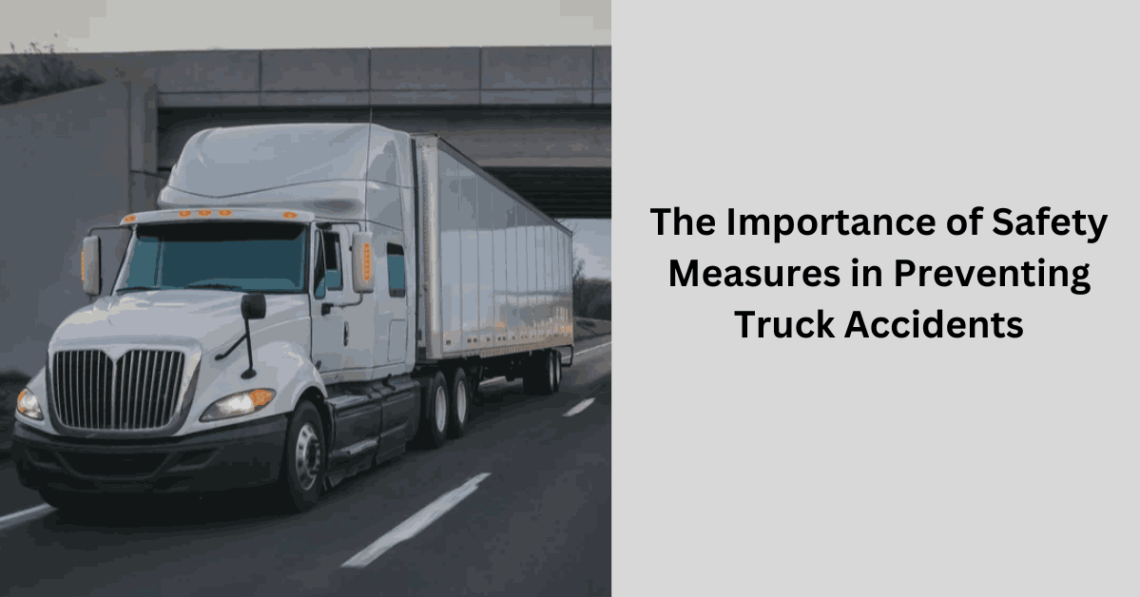
The Importance of Safety Measures in Preventing Truck Accidents
Trucking is a vital industry that plays a crucial role in keeping our economy running smoothly. With the transportation of goods and products being the backbone of many businesses, it is no surprise that there are over 3.5 million truck drivers in the United States alone.
However, with this large number of trucks on the roads, comes a significant risk of accidents. According to the Federal Motor Carrier Safety Administration, there were over 160,000 reported truck accidents in 2018, resulting in over 4,700 fatalities.
These statistics not only highlight the devastating impact of truck accidents but also emphasize the importance of implementing safety measures to prevent them.
In this article, we will delve into the importance of various safety measures in preventing trucking accidents and the significant role they play in safeguarding the lives of not only truck drivers but also other motorists and pedestrians on the road.
From regular maintenance to advanced technology, we will explore how these measures can greatly enhance the safety of the trucking industry and prevent tragedies on our roads.
Regular Maintenance Can Prevent Accidents
Regular maintenance plays a crucial role in preventing accidents within the trucking industry. By implementing a comprehensive maintenance program, trucking companies can identify and address potential issues before they escalate into safety hazards.
This includes regular inspections of key components such as brakes, tires, and lights, as well as routine servicing and repairs.
By ensuring that all vehicles are kept in optimal working condition, the risk of mechanical failures that can lead to accidents is significantly reduced. Additionally, proper maintenance helps to identify and address any structural or equipment deficiencies that could compromise the safety of the truck and its cargo.
By prioritizing regular maintenance, the trucking industry can demonstrate its commitment to safety and minimize the potential for accidents on the road.
Proper Training for Drivers Essential
Truck drivers must undergo thorough training programs that cover not only the technical aspects of operating a commercial vehicle but also emphasize safe driving practices and awareness of potential hazards on the road.
This includes training on defensive driving techniques, understanding and following traffic laws and regulations, proper load securement, and effective communication with other drivers.
By ensuring that drivers are well-trained and equipped with the necessary skills and knowledge, trucking companies can significantly reduce the occurrence of accidents caused by driver error or negligence.
Furthermore, ongoing training and refresher courses should be provided to drivers to keep them updated on the latest safety measures and industry best practices. By investing in comprehensive training programs, the trucking industry can prioritize safety and mitigate the risks associated with truck accidents.
Adhering to Regulations Saves Lives
In any industry, adherence to regulations plays a crucial role in ensuring the safety and well-being of individuals involved. The trucking industry is no exception. Strict adherence to regulations not only helps prevent truck accidents but also saves lives.
Regulations governing the trucking industry aim to address various aspects, including driver qualifications, vehicle maintenance, hours of service, and load securement. By following these regulations, trucking companies can maintain high standards of safety and minimize the risk of accidents on the roads.
Adhering to regulations means drivers are properly trained and qualified, vehicles are regularly inspected and maintained, and hours of service are monitored to prevent driver fatigue. It also means ensuring that loads are properly secured, reducing the risk of cargo shifting or falling off during transportation.
The commitment to adhering to regulations is a testament to the industry’s dedication to prioritizing safety and protecting the lives of both truck drivers and other road users.
Fatigue Management Is Key Factor
The demanding nature of the trucking industry, with long hours and tight schedules, puts drivers at a higher risk of fatigue-related issues. Fatigue impairs cognitive function, decreases reaction time, and affects decision-making abilities, making it a significant threat to road safety.
To effectively manage fatigue, trucking companies should prioritize implementing measures such as regular rest breaks, proper scheduling, and monitoring of driver hours.
Additionally, promoting a culture of health and wellness among drivers, including healthy sleep habits and physical fitness, can contribute to reducing fatigue and increasing alertness while on the road. By recognizing and addressing the importance of fatigue management, the trucking industry can significantly enhance safety measures and prevent potentially devastating accidents.
Technology Can Aid Prevention Efforts
Advancements in technology have provided valuable tools and resources that can aid in the prevention of truck accidents. One such innovation is the implementation of electronic logging devices (ELDs), which accurately track and monitor driver hours of service.
These devices not only ensure compliance with federal regulations but also help identify potential fatigue risks by alerting drivers and fleet supervisors when they are approaching their maximum allowable driving time.
Additionally, telematics systems equipped with GPS technology can provide real-time monitoring of vehicle speed, location, and driver behavior, allowing companies to identify and address unsafe driving practices promptly.
Furthermore, collision avoidance systems, such as forward collision warning and automatic emergency braking, utilize sensors and cameras to detect potential hazards and assist drivers in taking preventive actions.
Incorporating these technological advancements into safety measures can greatly contribute to mitigating risks, enhancing driver awareness, and ultimately reducing the occurrence of truck accidents.
Communication Between Drivers Is Critical
Clear and timely communication allows drivers to coordinate their movements, anticipate potential hazards, and make informed decisions on the road.
Whether it’s through the use of two-way radios, hands-free devices, or other communication tools, maintaining open lines of communication ensures that drivers can convey important information such as traffic conditions, road hazards, or unexpected situations.
This enables them to adjust their driving behavior and take necessary precautions to avoid accidents.
Furthermore, effective communication fosters a sense of teamwork and collaboration among drivers, enhancing their ability to work together to navigate challenging road conditions and safely share the road with other vehicles.
By prioritizing communication as a vital aspect of safety measures, trucking companies can significantly reduce the risk of accidents and promote a culture of safety on the roads.
Prioritizing Safety Benefits All Involved
To further emphasize the importance of safety measures in preventing truck accidents, it is crucial to understand that prioritizing safety benefits all parties involved.
Not only does it protect the lives of truck drivers and other road users, but it also contributes to the overall well-being of the trucking industry as a whole.
By implementing and strictly adhering to safety protocols and regulations, trucking companies demonstrate their commitment to the highest standards of safety and professionalism. This not only helps to reduce the number of accidents and injuries but also enhances the reputation and credibility of the entire industry.
Additionally, prioritizing safety measures can lead to cost savings for companies in the long run, as it reduces the likelihood of accidents, property damage, and legal liabilities. Ultimately, prioritizing safety benefits truck drivers, other road users, and the trucking industry as a whole, creating a safer and more sustainable environment for everyone involved.
Conclusion
It is crucial for trucking companies and drivers to prioritize safety measures in order to prevent truck accidents. By implementing proper training, maintenance checks, and following regulations, the risk of accidents can be greatly reduced. Not only does this protect the drivers and their cargo,
but it also ensures the safety of other drivers on the road. Let us strive to make road safety a top priority in the trucking industry, and work towards preventing accidents and saving lives.
You May Also Like

How Customer Identity Solutions Help Improve Customer Experience
August 1, 2023
5120x1440p 329 Hearthstone Wallpaper Even In This Down Economy
June 22, 2023

